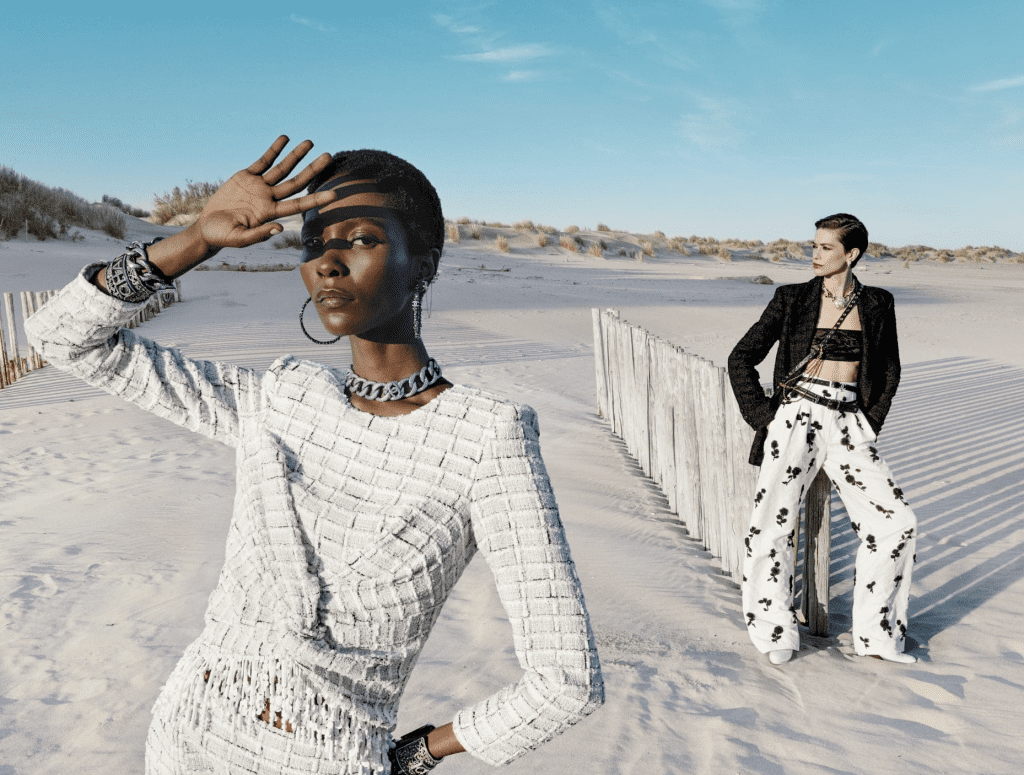Some Russian consumers are being blocked from purchasing coveted Chanel products in the wake of Russia’s invasion of Ukraine, as the brand aims to abide by European Union sanctions that prohibit the export of luxury goods to Russia. A spokesperson for Chanel confirmed that the brand has, in fact, “rolled out a process” in its stores outside of Russia “to ask clients for whom we do not know the main residency to confirm that the items they are purchasing will not be used in Russia,” a move that has spurred furor from Russian shoppers in markets, such as France, Italy, China, and Dubai.
“The latest sanctions from the European Union and Switzerland prohibit ‘the sale, directly or indirectly, of luxury items to any natural, legal person or entity in the Russian Federation or for use in the Russian Federation,’” Chanel said in a statement on Tuesday, noting that it is “currently working to improve the procedure.” Chanel – which maintains the title of the second largest luxury brand in the world, following only behind Louis Vuitton – also apologized in the statement “for any related misunderstandings and inconveniences” that have stemmed from its efforts to implement the newest EU sanctions that prohibit companies in the 27-member bloc from exporting luxury goods worth more than 300 euros ($330) to Russia.
(At the same time, U.S. President Biden signed an Executive Order in March that prohibits the exportation of luxury items “to any person located in the Russian Federation,” which the White House says “will ensure that U.S. persons are not providing luxury items, such as high end-watches, luxury vehicles, high-end apparel, high-end alcohol, jewelry, and other goods frequently purchased by Russian elites … who sustain Putin’s war machine.”)
Not an all-out ban, sales associates in Chanel stores are reportedly permitting purchases to Russian shoppers if they can show that they do not reside in Russia and/or agree in writing not to use the goods in Russia or otherwise export them to the country. (Worth noting: It will be interesting to see how Chanel views/treats products that are exported into Russia in violation of sanctions from a warranty perspective. All new Chanel bags and wallets on chain, for instance, that are purchased directly from Chanel enjoy an exclusive 5-year guarantee as of April 2021. There is a chance that bags that are imported in violation of state sanctions may not benefit from such terms of sale.)
It is not clear whether other brands will follow Chanel’s lead, or what the impact of such measures on brands’ bottom lines will be. As TFL previously reported, Chanel and other luxury (and non-luxury) brands have largely ceased operations in the Russian market – which accounts for no more than 3 percent of brands’ annual sales, respectively – in the wake of the war. However, cutting off sales to the richest of Russian consumers as a way to punish Russian President Vladimir Putin and his allies by implementing sanctions and requiring brands to closing their stores in Moscow and other Russian shopping cities is not necessarily straightforward. This is due, in part, to the fact that no shortage of deep-pocketed Russian consumers were already doing the bulk of their luxury shopping outside of the country in markets like London and Dubai, along with Milan and Paris, and presumably have resumed doing so in the midst of the war.
If an array of recent reports are any indication, a fair share of oligarchs and other wealthy Russians have already fled the country, and are shopping in other markets, such as the United Arab Emirates, where luxury brands remain open for business and sanctions similar to those being observed by the EU are not being imposed. As the Guardian reported late last month, no small number of rich Russians have taken to seeking refuge in luxury havens like Dubai, where “the oligarchs and other cashed-up Russians and their riches are welcome,” as the UAE has “not followed western governments in using sanctions as retaliation for the invasion of Ukraine.”
Jefferies analysts Flavio Cereda and Kathryn Parker stated in a note last month that the true impact of sanctions and store closures in Russia on luxury market players may be difficult to discern, as “many high spenders in this cohort [of consumers] have multiple passports and so, are difficult to identify.”
While Chanel made no mention of a rise in daigou-type operations in connection with its new screening system, it is relatively easy to see potential similarities coming into play here between the Russian market, which is currently cut off from luxury goods (and will be for the foreseeable future), and the system of parallel trade that enables Chinese consumers to gain access to luxury goods outside of traditional brand-operated channels, thereby, allowing them to sidestep region-specific price hikes that many brands put in place and steep value-added taxes, etc. for goods purchased on the mainland. The chance that such out-of-channel trade will flourish and lead to a free flow of grey market goods (i.e., authentic trademark-bearing products obtained from one market that are subsequently imported into another market and sold there without the consent) in Russia seems even more likely given recent reports that the Russian government has allowed for retailers to freely import and sell trademark-bearing goods without explicit authorization from the brand owners.











